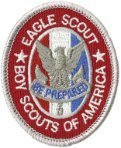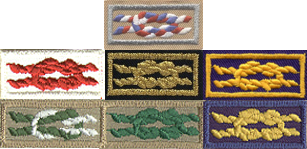-
Posts
2505 -
Joined
-
Last visited
-
Days Won
108
Content Type
Profiles
Forums
Articles
Store
Everything posted by InquisitiveScouter
-
At our Scout meeting, I talked with parents of our newest NYLT grad. During the NYLT session last weekend, there was a strong thunderstorm. (We live about 12 miles, as the crow flies, from the camp, and it was pretty intense here.) The parents told me their Scout was terrified...Scout reports that NYLT adult leaders told them to stay outdoors during the storm with visible lightning/audible thunder. Dining hall was about 250 feet away. The parents asked me about lightning safety precautions and why they weren't followed. I told them I'd look into it and report. I will seek some additional input from our other NYLTers to corroborate, and report this to our SE in the morning. Any advice or experiences to share?? These things, if true, really chap my hide, as they border on criminal...
-
I love this lesson for our Scouts: "The truth has a date and time stamp on it...especially for maps."
-
If it ain't raining, it ain't training!
-

Chapter 11 Announced - Part 9 - Confirmation Hearing
InquisitiveScouter replied to Eagle1993's topic in Issues & Politics
They are all underpaying to get their releases... It is the only way for them to survive. If they paid what they should, they'd be gone... -
Wonder if you could buy the mortgage on Philmont? Then, when BSA fails, claim the property.
-

Revised Pre and Ordeal ceremonies?
InquisitiveScouter replied to Oldscout448's topic in Order of the Arrow
We are kindred spirits, then. I am glad that climate does not exist where you are. Please forgive me for drawing that conclusion from your post. I have heard this phrase repeatedly in the last two lodges I have been a member of, and it is used as a pejorative. Concur on your Brotherhood observations...sadly. In the last 10 or 15 years, I have experienced Lodges becoming more self-centered. The focus has been on the Lodge's program and what they can do to get Arrowmen to serve that program. I hope you agree this is a corruption of the purposes of the OA. I firmly believe this turns a lot of Scouts and Scouters off to Lodge membership. We could start another post on the topic of remedies for low Lodge participation... -

Revised Pre and Ordeal ceremonies?
InquisitiveScouter replied to Oldscout448's topic in Order of the Arrow
Perhaps many do this because of the culture in your lodge that promotes using terms like "sash and dash"? I also am appalled... I ask you to reconsider using such a derogatory phrase toward your fellow Scouts and Arrowmen. You say you are an "ex" ceremonialist, performer, and coach. I believe your using this phrase reveals a fundamental misunderstanding of what the Order of the Arrow is about. The Order of the Arrow exists to serve a unit's recognition of their Scouts and the promotion of camping within the council. Purpose As Scouting’s National Honor Society, our purpose is to: Recognize those who best exemplify the Scout Oath and Law in their daily lives and through that recognition cause others to conduct themselves in a way that warrants similar recognition. Promote camping, responsible outdoor adventure, and environmental stewardship as essential components of every Scout’s experience, in the unit, year-round, and in summer camp. Develop leaders with the willingness, character, spirit and ability to advance the activities of their units, our Brotherhood, Scouting, and ultimately our nation. Crystallize the Scout habit of helpfulness into a life purpose of leadership in cheerful service to others. There is not one thing at all in there about Scouts having some obligation to serve the lodge. "An Arrowman’s first duty is to his unit. We must always keep in mind that a primary role of the Order of the Arrow is to strengthen units and help units to succeed, particularly in the outdoor phase of their program." This is from your Guide for Officers and Advisors. The Order of the Arrow is part of a unit program. If the Scouts of a unit wish to bestow the honor of OA membership on one of their own, neither you nor anyone else in the lodge have diddly squat to say about it. You are there for them... If, after election, a Scout wishes not to undertake the Ordeal, that is just fine. It's his prerogative. If the Scout wishes to complete his Ordeal, and never do a thing to support the lodge, that is just fine, too. Lodge membership is always a choice (through paying your annual dues first, then doing whatever else you wish as part of the lodge program.) After completing the Ordeal, a Scout is then ALWAYS a member of the Order, whether or not he chooses to renew his membership in the lodge. "I will always regard the ties of brotherhood in the Order of the Arrow as lasting..." Using the phrase "sash and dash" does not show a spirit of Brotherhood. In the Wimachtendienk, Amangiechsin 1984 -

STEM and Nova going away?
InquisitiveScouter replied to FireStone's topic in Open Discussion - Program
I am a Nova and Supernova Counselor, and have been for years. I have offered program support to our PLC, District, and Council. In my six years in this council, only our Webelos Den worked on the Supernova, and one other Lone Cub Scout completed same. It is one smaller, unrequired layer of an extremely complex tapestry of Ranks, Merit Badges, and Awards. There just isn't that much interest... Guiding them on a somewhat narrower path to Eagle is about as much as most want to pursue... -

Citizenship in Society MB - Eagle Required
InquisitiveScouter replied to Better4itall's topic in Advancement Resources
Ensuring two-deep leadership if circumstances dictate, speak privately and respectfully with the person demonstrating bias to coach them in how to remedy the behavior in the future. Check on the recipient of the inappropriate behavior, ensuring their well-being and making sure they understand that they are valued and that the behavior they witnessed is not a Scouting value. Report the incident to the Scout Executive. Even seemingly minor/resolved incidents can be offensive to recipients of the behavior and deserve to be treated as a possible violation of Scouting’s Barriers to Abuse. Ok, so working through this "training" atm....and I read this.... Uh, no...I'm not going to report minor incidents, such as a Scout telling an offensive joke, to our SE as a "...possible violation of Scouting's Barriers to Abuse." -
Ahhh... learn something new every day! I was under the mistaken idea that Philmont charged for crews rather than individuals. Thanks for the correction! But, there is still the minimum of 8 per crew, right? So such a resource could be helpful. Asking for a father-son team who wish to go (they cannot make the timing of our council contingent)...the individual opportunities are open only to youth, right? (or am I mistaken on that, too??)
-

Citizenship in Society MB - Eagle Required
InquisitiveScouter replied to Better4itall's topic in Advancement Resources
Don't forget the cover sheet...hmmm...that'd be great... That reference is actually more applicable in another regard, as this badge is really just "flair" -

Chapter 11 Announced - Part 9 - Confirmation Hearing
InquisitiveScouter replied to Eagle1993's topic in Issues & Politics
This practice just does not sit right with me... Purchasing a third-party release from liability through our judicial system at pennies (or less) on the dollar? Does this not remove a victim's right to due process? I've turned this over in my head and heart for many months. I can find no other way to see this. Our justice system should not operate this way. It stinks. -

Chapter 11 Announced - Part 9 - Confirmation Hearing
InquisitiveScouter replied to Eagle1993's topic in Issues & Politics
Here's a non-firewalled link directly to AP News... https://apnews.com/article/business-religion-delaware-sexual-abuse-by-clergy-dover-287019e3686c8b0005ffe6ee715a4a04 -
The only apparatus I know of for this "Quality Control" and some sort of 'standardization' of program and execution would be through a Commissioners' Corps. This is one critical area lacking in our council...I think because the primary pool of candidates for Commissioner, those 'graduated' unit leaders, have become jaded by how crappily (is that a word?) our council is run and how our dedicated volunteers are treated with disdain... No one wants to join a losing team, especially when they have seen others with equal dedication join that team and just get beat down...
-
You got that right! But, there is loads of research touting the value of unstructured time as critical for youth development.
-
One thing we have put into the Troop culture for trip planning is to block off 3 or 4 hours of 'unstructured time' where the Scouts figure out what they want to do 'in the moment'. All kinds of Scouting breaks out...one set of buddies builds (another) fire, some hike, some have a rock skipping contest, flag folding, lashing, knife, ax, and saw work, rope work, some grab an older Scout or adult to work on requirements, etc, etc, etc The only limitation is that you cannot sit around playing on a screen.
-

Whenever 2 or more troops meet
InquisitiveScouter replied to PACAN's topic in Open Discussion - Program
Your wisdom is worth much more🙂💪😜 -

Whenever 2 or more troops meet
InquisitiveScouter replied to PACAN's topic in Open Discussion - Program
This rule is ludicrous. To the point, as an SM, I answer to the Troop Committee Chair and the Chartered Org Rep. In the case of multiple units camping together, if all CORs approve, the district or council can't say squat. This is probably the only lever that National wants the LCs to pull anyway. If you have CO top-cover, thru your COR, you are good to go. So, if you have say an email chain from the three CORs approving the event, you could send that to your DE, informing them of your outing, so they know, for 'legal' purposes only. If your COR is not FULLY aware of the scope and program for your outings, then you have failed to 'let your boss know what you are doing' -
It's not green!! That's what!!
-
No, Barry, it is the volunteers at the unit level who are "teaching" it. I find few examples in the professional corps who are teaching it. And I look for them. When I do find them, I praise them profusely and support them. Publicly and privately. Can't speak for @yknot of course. The last three DE's I had significant contact with, who walked the talk, have left BSA employ. Two of the three because of the internal rottenness they could no longer stomach. It's been a long while since I have interacted with an upstanding SE. Totally agree this is my subjective opinion, and others are free to believe and behave otherwise...




